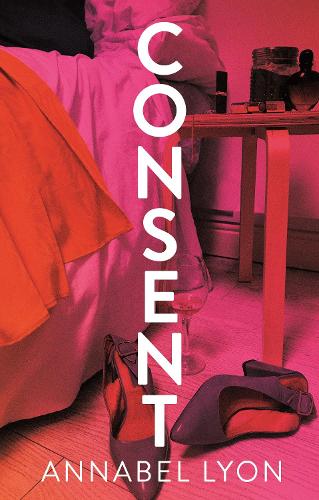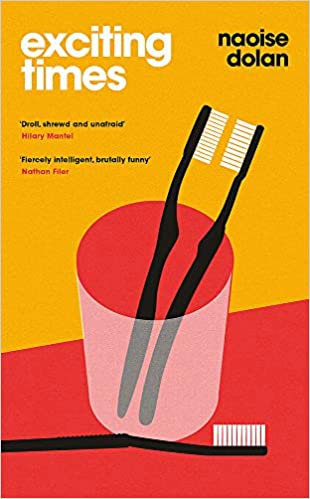(Perhaps someone should actually write a novel called Consent and Exciting Times, it sounds fun).

Annabel Lyon’s latest novel, Consent, is almost impossible to summarise swiftly (which may explain why the British publisher has pretty much given up and written an inaccurate summary of the entire plot on the back cover, but publishers, this really isn’t a good idea – apart from anything else, it makes Consent sound like a thriller, which it is not). In short, it’s about two pairs of sisters. Sara’s sister Mattie is intellectually disabled, and Sara starts caring for her after the death of their mother. Saskia’s sister Jenny has been out of control since she was a teenager, and now she’s in a coma following a car accident. Lyon packs so much into this relatively slim novel that there are probably multiple ways of summarising what it’s really ‘about’, but I found myself particularly picking up on the theme of bodily autonomy – what we are allowed to do with our bodies, and how that’s related to both our intellectual capacity and our capacity to live independently from other people. We valorise independence, but we’re all dependent. We want freedom, but we often throw away the things that would allow us to seek it. Some of us, Lyon seems to be saying, are allowed to wreck our own lives; some of us are not.
I thought this novel was fantastic, but I’m struggling to say why. I imagine many readers will find it incredibly unsatisfying. Lyon’s writing is elliptical, deliberately looping round pieces of key information so we have to be constantly engaged to work things out for ourselves. Such intensity might have been too much in a longer novel, but in this short book it’s perfect, like one of the strong espressos Sara drinks or the expensive scents she wears. It also strays close to the ironic commentary of some ‘millennial novels’ I’ve read without giving into the temptation to say things that are too easy. (Sara, born in the 70s, is also too old to be a millennial, and I liked the juxtaposition between her inner monologue and that of the younger Saskia’s). I’d never heard of Lyon before she was longlisted for the Women’s Prize, but now I want to check out her entire backlist. Brilliant choice, judges.

It’s a rare novel that draws praise from both Marian Keyes and Hilary Mantel, but both are quoted on the cover of my copy of Naoise Dolan’s debut, Exciting Times. As regular readers of this blog will know, I’ve been steering clear of this for some time because I felt it would be yet another ‘dysfunctional women being dysfunctional novel’, but after some persuasion, mostly by Elle, I decided to give it a try. And I’m glad I did; this is much weirder and more interesting than your typical novel about a young woman messing her life up. Ava is working as a TEFL teacher in Hong Kong, partly because she doesn’t know what to do next with her life and partly to avoid living at home in Dublin. She finds herself hate-dating banker Julian, and stays in his flat when he leaves Hong Kong for months on business. But then she meets Edith, and finds herself building a relationship that’s much sweeter and more genuine – although, if that’s really the case, why is she still so drawn to Julian?
Ava’s narration makes this novel. She’s interested in language in a way that feels much more illuminating than the wordplay that writers like Ali Smith sometimes indulge in, musing on the differences between Irish English and the ‘correct’ form of English that she’s instructed to teach to her students, as well as the differences between English and the languages she encounters in Hong Kong. Her voice is also pitched very carefully between being relatable and alienating, which perhaps explains why both Keyes and Mantel enjoyed this. Bits of Exciting Times did take me right back to my early twenties, when being the least keen in a relationship was so important, and you get interested in people who seem to be the antithesis of everything you say you believe in, because they come from a world you’ve never encountered before. However, Ava isn’t an everywoman; she’s both terrible and brilliant at social interaction, and makes some very bizarre judgments about others. She comes off at first like the kind of astute narrator that we can laugh along with, but we gradually realise how off-kilter her ideas are. All this is really cleverly handled, and although I didn’t quite fall for Exciting Times, I definitely admired it.
I’m not aiming to read all sixteen books on the Women’s Prize longlist this year, but I’ve selected seven titles that I do want to read. These are numbers four and five. I’ve already read The Vanishing Half ,Transcendent Kingdom and Piranesi.
I’m glad you enjoyed Exciting Times more than you expected to. I agree that Ava’s voice really made it stand out.
You’ve got me intrigued about Consent. I’m eagerly awaiting my library hold!
LikeLiked by 1 person
I imagine Consent will be pretty divisive! I’ll be interested to see what you think of it.
LikeLike
Great reviews! I’m especially keen to try Consent.
LikeLiked by 1 person
Look forward to hearing what you think of it!
LikeLiked by 1 person
I’m happy to hear you liked Consent so much! It is hard to talk about without giving things away. I’m also looking forward to reading more of her!
I felt the same about Exciting Times… I might not have been interested if it weren’t for all the positive reviews I’ve seen. Including this one! It’s now on my list!
LikeLiked by 1 person
Hope you enjoy Exciting Times! Yes, I did feel for the publishers in trying to sell Consent. The British blurb is quite elegant but does basically relate the whole plot.
LikeLiked by 1 person
I felt the same as you with Exciting Times and have just finished it. I did enjoy it a lot more than I thought and Dolan can really write. It will be interesting to see where she goes from here.
LikeLiked by 1 person
Yes, I wonder if she’ll write another novel of this kind, or something completely different!
LikeLike
I’ve read Lyon’s much earlier novel The Golden Mean – about young Alexander the Great and Aristotle which was rather brilliant. Consent is obviously very different, but still character driven. I’d love to read it. I very much enjoyed the Dolan. She is autistic, which I only read after reading the book, and now looking at it I’d read Ava slightly differently perhaps.
LikeLiked by 1 person
Good to know about The Golden Mean! I knew Dolan was autistic before reading Exciting Times. I wouldn’t necessarily read Ava as autistic, although I see that she could be read that way.
LikeLike
I admire both books without needing to read them – which is fine, of course!
LikeLiked by 1 person
So glad you enjoyed both of these! Consent was a tough one for me to review as well. It’s hard to talk about without giving anything away (I hate the summary too) and it’s also hard to talk about what works. I adored it though. And I totally agree with your comments about the way bodily autonomy is portrayed.
LikeLiked by 1 person
Consent has immediately become my second favourite book on the WP longlist (snapping at the heels of Transcendent Kingdom!). I fear you’re right that it won’t make it to the shortlist, but it deserves to be there.
LikeLiked by 1 person
I think my second favorite might be Piranesi, weirdly enough (because I really did not think that would be my kind of book), but Consent is very close behind! I would be so shocked and delighted if it made the shortlist. What a gem.
LikeLiked by 1 person
Pingback: Women’s Prize for Fiction 2021: Small Pleasures | Laura Tisdall
Great reviews! I’ve recently finished Exciting Times and largely agree with you on that one, and am eager to pick up Consent within a week or two. Your response to that one definitely has me intrigued, it sounds like it could be right up my alley, and just the sort of thing I’m excited to find through the Women’s Prize. Glad you enjoyed both!
LikeLiked by 1 person
Consent is going to be pretty divisive, I predict, but I’ve now read all 7 of the longlisted titles I was planning to read and it’s my favourite after Transcendent Kingdom!
LikeLiked by 1 person
Pingback: Women’s Prize for Fiction 2021: Detransition, Baby | Laura Tisdall
Pingback: Women’s Prize for Fiction Shortlist, 2021: Wishlist and Predictions | Laura Tisdall
Pingback: Women’s Prize for Fiction 2021: No One Is Talking About This | Laura Tisdall
Pingback: Women’s Prize for Fiction 2021: Unsettled Ground | Laura Tisdall
Pingback: Women’s Prize for Fiction, 2021: How The One-Armed Sister Sweeps Her House | Laura Tisdall
Pingback: Women’s Prize for Fiction 2021: Final Thoughts | Laura Tisdall
Pingback: 2021 in Books: Commendations and Disappointments | Laura Tisdall
Pingback: New Year Superlatives | Laura Tisdall
Pingback: Women’s Prize for Fiction, 2022: The Bread the Devil Knead and Sorrow and Bliss | Laura Tisdall
Pingback: The Waterstones Debut Fiction Prize, 2023: Kala and Close To Home #LoveYourLibrary | Laura Tisdall